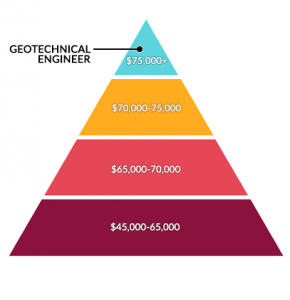More About Geotheta
More About Geotheta
Blog Article
Not known Details About Geotheta
Table of ContentsThe 2-Minute Rule for Geotheta5 Easy Facts About Geotheta ShownAn Unbiased View of GeothetaGeotheta Can Be Fun For AnyoneExcitement About Geotheta

They conduct site examinations, collect samples, carry out research laboratory examinations, and evaluate information to evaluate the suitability of the ground for construction projects - Geo Tech Engineering. Based upon their searchings for, geotechnical engineers supply referrals for foundation design, incline security, retaining structures, and reduction of geotechnical threats. They collaborate with other professionals, such as architects, structural designers, and construction teams, to guarantee that geotechnical considerations are incorporated into the overall task layout and execution
By assessing the behavior and homes of dirt and rock, they can determine prospective geotechnical dangers such as landslides, dirt settlement, or incline instability. Their competence assists prevent failings or crashes that might threaten lives and home. Below are some thorough obligations and responsibilities of a geotechnical designer: Site Examination: Geotechnical engineers conduct website examinations to collect data on subsurface conditions.
They translate the information to comprehend the homes and actions of the dirt and rock, including their toughness, leaks in the structure, compaction qualities, and groundwater conditions. Geotechnical Analysis and Style: Geotechnical designers examine the information accumulated throughout website examinations to evaluate the security and viability of the website for building tasks. They perform geotechnical computations and modeling to assess elements such as bearing capacity, settlement, incline security, lateral planet stress, and groundwater flow.
Little Known Questions About Geotheta.
Foundation Design: Geotechnical designers play an essential duty in creating structures that can safely support the designated framework. They examine the dirt problems and tons demands to determine the ideal foundation kind, such as shallow foundations (e.g., footings), deep structures (e.g (https://www.slideshare.net/ianhammond2191)., stacks), or specialized techniques like dirt renovation. They take into consideration variables such as negotiation limitations, birthing capability, and soil-structure interaction to develop optimum structure styles
They examine construction plans, display site tasks, and carry out field inspections to validate that the style recommendations are adhered to. If unanticipated geotechnical concerns develop, they evaluate the scenario and offer suggestions for removal or changes to the style. Risk Analysis and Mitigation: Geotechnical engineers assess geotechnical threats and threats connected with the project site, such as landslides, liquefaction, or dirt erosion.

Cooperation and Communication: Geotechnical engineers function closely with various other professionals entailed in a job, such as engineers, architectural designers, and construction teams. Efficient communication and collaboration are vital to incorporate geotechnical factors to consider into the total project layout and building procedure. Geotechnical designers provide technical knowledge, response queries, and guarantee that geotechnical demands are satisfied.
A Biased View of Geotheta
Below are some sorts of geotechnical engineers: Structure Designer: Structure designers concentrate on designing and evaluating structures for frameworks. They assess the soil conditions, load requirements, and site features to establish one of the most appropriate foundation kind and layout, such as superficial foundations, deep foundations, or specialized methods like heap structures.
They review the variables affecting incline security, such as dirt residential or commercial properties, groundwater conditions, and incline geometry, and develop methods to avoid slope failings and mitigate risks. Quake Engineer: Earthquake designers focus on examining and creating frameworks to hold up against seismic pressures. They evaluate the seismic risk of a site, review dirt liquefaction potential, and create seismic layout criteria to ensure the safety and durability of structures throughout earthquakes.
They do field testing, collect examples, and examine the gathered data to identify the soil residential properties, geologic formations, and groundwater problems at a website. Geotechnical Instrumentation Designer: Geotechnical instrumentation engineers concentrate on monitoring and gauging the habits of soil, rock, and frameworks. They set up and maintain instrumentation systems that keep track of aspects such as soil settlement, groundwater degrees, slope movements, and structural variations to analyze performance and give early cautions of prospective issues.
Things about Geotheta
They perform examinations such as triaxial tests, consolidation examinations, straight shear tests, and leaks in the structure examinations to gather information for geotechnical evaluation and layout. Geosynthetics Engineer: Geosynthetics designers focus on the layout and application of geosynthetic materials, view publisher site such as geotextiles, geogrids, and geomembranes. They utilize these products to improve soil security, enhance slopes, supply water drainage remedies, and control erosion.
They often tend to be investigatory individuals, which means they're intellectual, introspective, and analytical. They are curious, systematic, reasonable, logical, and sensible. Several of them are also social, suggesting they're kind, charitable, cooperative, individual, caring, handy, compassionate, tactful, and pleasant. Does this audio like you? Take our complimentary occupation test to learn if geotechnical designer is one of your leading profession matches.
In the office atmosphere, geotechnical engineers utilize specialized software devices to perform calculations, develop layouts, and analyze information. They prepare records, evaluation project specs, connect with customers and employee, and coordinate task tasks. The workplace setting supplies a conducive atmosphere for research study, evaluation, and cooperation with various other experts associated with the task.
Everything about Geotheta
They often see task sites to conduct website investigations, assess geotechnical conditions, and collect data for evaluation. These gos to entail taking a trip to various places, occasionally in remote or difficult surfaces. Geotechnical engineers may execute soil sampling, conduct examinations, and display building and construction tasks to guarantee that the geotechnical facets of the project are being carried out appropriately.
Geotechnical designers also work in specialized geotechnical labs. Geotechnical laboratory engineers work extensively in these environments, handling testing devices, operating instruments, and recording information.
Report this page